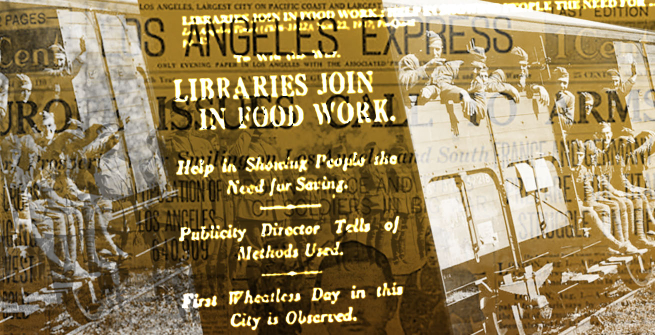Staff working at the library during World War I were living through interesting times. They made a lot of choices, some of which were commendable and others which left us scratching our heads. For example, in 1913, just before the beginning of war in Europe, the library received a much-lauded collection of nearly 1,000 German books, "every reader is sure to find something of interest among the wide range of biographies, history, travel, art, literature…" They were right to be proud to acquire something that would appeal to the 20,000 German-speaking Angelenos, almost 20% of the city's population at that time. But four years later, the same year the US declared war against Germany, this new collection, along with other German books, were "interned under lock and key…for the duration of the war. "And quarantining books written in German was not enough, according to Library board president Ora Monnette. "I believe that the lines will be more and more closely drawn as the war proceeds. It is quite probable that many books printed in English contain paragraphs that are directly advancing the pro-German propaganda and ideals, and they will be searched out and discarded." Although today one thinks of the library as the defenders of the "Freedom to Read," there have been many tests of that ideal, and in 1917, the library failed.
But if the library failed in the fight against censorship, the library succeeded in putting periodicals and books where they were needed most, in the hands of the armed forces. When the library war council appointed by the secretary of war set a goal to raise 1 million dollars for access to reading materials in soldiers' camps, City Librarian Everett Perry was appointed to head up the Western region. He was charged with raising $25,000. Of that amount, $20,000 was raised by the library alone, with the last $5,000 being raised in neighboring cities and Arizona.
Don't think the response to the war came only from the Board and the City Librarian. The departments had a role to play as well. There was a lot of food rationing during the war, including strictly enforced meatless Tuesday and strongly recommended "wheatless" days. The US Food Administration asked libraries to help people save food during the war.
"Each locality has its food problem. Therefore each librarian should consider himself or herself a local leader…to tell people how and why conservation is essential to the success of the Allied armies. It is the librarian's opportunity for serving the country."
The Industrial Department of the library responded by creating a card catalog of recipes: a war cookbook. Not only did they gather recipes for items like Liberty bread and war pie, but they also made sure all recipes used ingredients that could be economically obtained, and they prepared and taste-tested each item before including it. According to the L.A. Times:
"This cookbook is more complete than can be found in any single book and contains the best in all the books and many recipes that have not yet been included in even the latest publications."
The Art Department's response was to mount an exhibition of prints of famous memorials to war throughout history. Perhaps more interesting was the War trophies exhibition mounted by the Sociology Department containing examples of Allied propaganda, a French bayonet, and a collection of French posters.
There was even news from the branches. When the US joined the War in 1917, the draft was reinstated. The board in charge of collecting draft exemptions tried to take over a section of the Northeast branch library, but Helen Spots, assistant librarian, protested. She had to come before the library board to defend herself against charges that her attitude was in "opposition to the draft, pro-German in its effect, treasonable in its nature" Although the board determined that she was overzealous but not actually pro-German and accepted her apology partially in consideration that she was the sole caregiver for her ailing mother, it is interesting to think about the impact of one's words and actions in this crisis. With all the recent calls for the resignation of City council members who used derogatory language, one wonders if Ms. Spots' appeal would have had a different outcome today.
